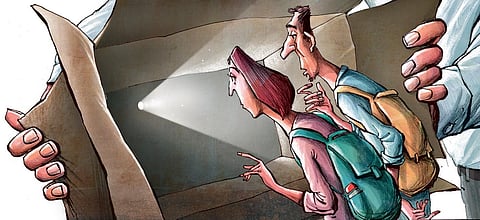

The founders and management of Ashoka University have learned the hard way how not to go about building a great private university in India. For starters, the primary purpose of a university is not just to criticise the government of the day. Nor of star faculty members, or academic leaders of an institution of eminence, merely to mount daily rants against national leaders or ruling party politicians.
The primary purpose of a university is to enable the teaching and training of students in a wide variety of fields so that they can be useful members of society and leaders of tomorrow. It is to foster the true blossoming of personality and human potential. It is also, through high standards of research and pedagogy, to create new knowledge and exciting possibilities for the future.
If much of the energy of a university, including the time of its faculty and students, is diverted to political posturing, a university is bound to decline sooner or later. It is not that a firewall should be built between the campus and the outside world. Rather it is to remember that what happens in classrooms, labs and libraries is sacred and must not be compromised by ideological considerations.
The nurturing of real knowledge and competence, whether in the liberal arts and sciences or in professional disciplines such as engineering, medicine or law, cannot be condensed to ideological pomposity or grandstanding. Similarly, political correctness—or for that matter—incorrectness cannot be a substitute for real fitness in a field, let alone true expertise. Opinion mongering comes easy; the hard work to build deeper understanding and comprehension is much more difficult.
Unfortunately, across the world, education in the humanities and social studies has become so ideologised that little attention is paid to developing basic skills in reading and writing, let alone critical thinking. A lazy reductionism, wherein intellectual traditions or texts are read in terms of pre-set toolkits, has overtaken real debate, dissent and discussion on many campuses across the world.
This crisis in the humanities and social studies has infected Ashoka University too. For one, the faculty, far from being diverse intellectually, is packed with similar-thinking and similar-sounding colleagues. In fact, the founders, donors and promoters are more politically diverse than the faculty.
How has this happened? The answer is simple. An intolerance for contrary positions is masked under the guise of maintaining standards. As it turns out, the only standards that are maintained are ideological, rather than academic. A Left-Liberal (LeLi) echo-chamber is not a vibrant or intellectually diverse academic community that a great university demands.
Furthermore, Ashoka seems to have totally missed out on both the scholarly challenges and opportunities of resurgent India, even as it represents its economic and monetary capabilities. This mismatch is at the root of its troubles.
Ashoka’s intellectual leadership reflects the “UPA,” or to put it even more bluntly, “the Nehruvian consensus” of a bygone era. A new idea of India has overtaken Ashoka, leaving its academic leaders and founders marooned in a space where they risk being irrelevant, if not reviled.
Surely academic freedom does not comprise only one side of an argument. Call them “right wing”, “conservative” or even “Hindutva”-vadis—where is this other side in Ashoka? By ignoring or excluding it altogether, Ashoka too has practiced the kind of untouchability or exclusionism that is the tell-tale mark of illiberalism masquerading as liberalism.
But is the surrounding society and the larger body politic interested? No. They have moved on, joining the groundswell that believes in the new India whose possibilities these very intellectuals have denied or denigrated in the past decades, with their doomsday predictions.
Hunting in packs so to speak, powerful cabals have policed academia, silencing and bullying dissenters, recruiting their own kind and ensuring ideological conformity rather than diversity. Now, the mafia-like control and territoriality of these lobbies has come back to bite the founders and backers of Ashoka.
The latter have now understood that these factions are liabilities rather than assets. These LeLi bullies are blocking the growth of the university and making it unattractive to a large section of the fee-paying middle and upper classes who send their wards to this university. Hegemonic Left-Liberalism on campuses is preventing the connect of the university to the society or nation of which it is a part.
The crisis at Ashoka is not an outcome of political interference but of a deeper disconnect between the faculty and the country. Instead of being leaders, they are laggards. Busy defending yesterday’s ideas rather than generating tomorrow’s visions, their embattled and beleaguered virtue signalling and compulsive criticism demonstrate a siege mentality and disengagement from the national mainstream. To put it bluntly, they have become ‘uncool.’
Apart from ‘speaking truth to power,’ intellectuals, whether public or private, need to continue to read, write, teach and produce new knowledge. To allow a university or institution of learning to be turned into a political platform or soapbox is against the very ideals of liberal education that universities such as Ashoka supposedly espouse. It is also really bad for business.
The Ashoka imbroglio is not about the resignation, voluntary or nudged, of Pratap Bhanu Mehta. It is not about intellectual integrity or grit of freedom of expression. Rather, it is about the growing irrelevance of a certain imported and internationally supported brand of elite intellectual custodianship of the Indian Republic that is no longer fashionable, sustainable or appropriate.The times they are a-changing. Those who plough and sow in intellectual or academic furrows also need to wake up and smell the chai.
Makarand R Paranjape
Director, Indian Institute of Advanced Study, Shimla. Views are personal
(Tweets @MakrandParanspe)